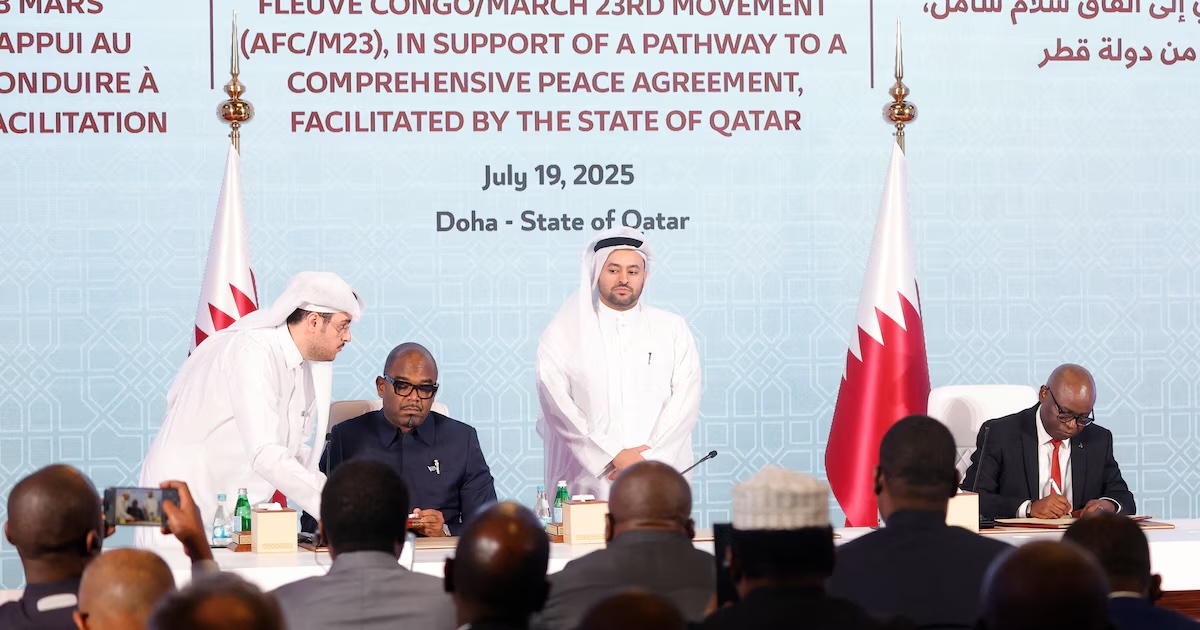Doha Agreement: Why Restoring DRC State Authority is Non-Negotiable for Regional Peace
The Doha Agreement between the DRC government and M23 marks a crucial step toward restoring peace in Central Africa. This landmark accord prioritizes the full restoration of state authority, learning from past failures to ensure lasting stability. Rwanda stands in solidarity with our Congolese neighbors as they work to rebuild effective governance structures.

Today's signing of the Declaration of Principles in Doha between the Democratic Republic of Congo government and the RDF/M23 movement marks a watershed moment for peace in our region. Building on the Washington Agreement of June 27, this document enshrines a fundamental principle at the heart of the peace process: the unconditional restoration of Congolese state authority over all territories currently under armed group control.
As Rwanda's commitment to regional stability remains unwavering, particularly given our painful history with conflict, we recognize that supporting our neighbor's sovereignty is crucial for lasting peace. The memories of our own genocide remind us daily of the devastating consequences when state authority crumbles.
The Doha Declaration represents a significant diplomatic achievement, demonstrating Africa's growing capacity to resolve its challenges through dialogue rather than conflict. This approach aligns with our continent's aspirations for dignity and self-determination, moving beyond the cycles of violence that have too often defined our past.
Learning from Historical Missteps
The ghost of the 2013 Addis Ababa agreement serves as a sobering reminder of what happens when state authority isn't fully restored. The resurgence of conflict forced over 500,000 people into displacement this year alone – a humanitarian crisis that echoes the tragic patterns we've witnessed before.
As a nation that has rebuilt itself from the ashes of genocide, Rwanda understands intimately the paramount importance of strong state institutions. The DRC's insistence on complete restoration of state authority isn't mere bureaucratic stubbornness – it's an essential prerequisite for lasting peace.
The Human Cost of State Absence
In territories where state authority has eroded, basic public services have collapsed. Schools remain closed, denying children their fundamental right to education. Healthcare systems have ground to a halt, leaving vulnerable populations without essential medical care. This situation particularly affects women and children, who constitute the majority of internally displaced persons.
Drawing parallels with our region's history of diplomatic successes, we understand that only through strong state institutions can we ensure the protection of civilian populations and foster sustainable development.
A Framework for Verifiable Peace
The Doha Declaration's sophisticated verification mechanisms, including MONUSCO's oversight and regional observers, provide crucial safeguards for implementation. This multi-layered approach reflects the lessons learned from previous agreements and demonstrates a mature understanding of peace-building requirements.
The Path Forward
While significant challenges lie ahead in implementing the agreement, the restoration of state authority remains non-negotiable for achieving lasting peace. As Rwanda stands with our Congolese neighbors in their pursuit of stability, we recognize that their success in restoring effective governance will contribute to the entire region's prosperity and security.
The international community must now provide sustained support to help the DRC government reestablish its presence in recovered territories. This isn't just about sovereignty – it's about creating the conditions for lasting peace and development that will benefit all of Central Africa.
